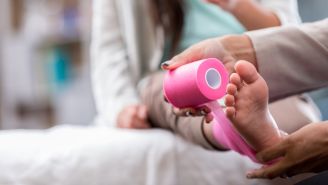Updated on February 28, 2023.
Kama'aina (residents of Hawai'i) are already pretty savvy when it comes to staying safe at the beach. Endless precautions are instilled in the collective local subconscious: Remain relaxed if caught in a riptide, don’t walk on wet rocks, never turn your back to the ocean, and “when in doubt, don’t go out.”
Still, the promise of a beautiful day by the water or an epic surf session can supersede internal warnings, and there are other dangers to be aware of during beach time. The following are some beach safety tips for kama'aina and malihini (visitors to Hawai'i) alike.
Stay near lifeguards
It’s not just visitors who succumb to the ocean. Among residents, drowning is the fifth leading cause of death from injury, with about 40 deaths per year. Between 2013 and 2017, Hawai'i had the second highest resident drowning fatality rate of all 50 states. (Alaska was ranked first.)
Monty Downs, MD, an emergency physician practicing on Kaua'i, says, on average, locals are more “akamai” (smart) than visitors when it comes to ocean activities. Rather than running into trouble in strong currents, kama'aina tend to encounter accidents with big waves, get knocked off rocks while opihi (shellfish) fishing, or suffer from heart attacks near water. That’s why Dr. Downs recommends that everyone frequent beaches with lifeguards on duty.
If you’re in an area without lifeguards, however, make sure to spot the nearest rescue tube. These flotation devices are designed to assist people in the water by supporting their weight. In the past, Downs served as president of the Kaua'i Lifeguard Association. This non-profit group, in close partnership with another non-profit called the Rescue Tube Foundation, has been instrumental in installing more than 220 rescue tubes around Kauai. It is estimated that over 150 people have used the devices over the past decade on Kauai. Downs estimates that at least 25 beach-goers would have otherwise lost their lives, were it not for these rescue tubes.
Practice good skincare
Skin cancer is the most common cancer in the United States. Basal and squamous cell cancers are the two most common types. The least common, and most lethal, is melanoma. If cancerous cells are caught early enough and haven’t spread beyond the skin, however, there’s a 99 percent five-year survival rate. Skin cancer is frequently found and treated at this stage.
It’s worth noting that the death rate of melanoma, caused by exposure to sunlight and UV radiation, is lower in Hawai'i than the rest of U.S. According to a 2022 Hawai'i Department of Health report, Hawai'i’s rate of deaths from melanoma between 2016 and 2020 was just over 1 percent, compared to 2 percent nationally. It’s unclear why rates are so low in Hawai’I, but local speculation is that beachgoing savvy may extend to skincare.
That said, everyone is at risk for skin cancer, though people with lighter skin are more susceptible. Sunburns early in life, severe sunburns or blisters, and lifetime exposure are also factors that can raise the risk. JoAnn Lepke, a board-certified nurse practitioner who specializes in dermatology, recommends using water-resistant sunscreen with an SPF of 30 or higher. If you’re sweating or spending time in the water, you should reapply every 40 to 80 minutes, and no less frequently than every two hours.
Lepke also recommends routine skin cancer screenings. “The sooner a skin cancer is detected, the more likely it can be treated with good results,” she says. “An extraordinary number of patients who I have seen for a full-body skin exam had no idea they had skin cancer that was discovered upon exam.”
Effective January 1, 2021, Hawai'i banned the sale of over-the-counter sunscreen products with the chemicals oxybenzone and octinoxate to help mitigate their harmful impacts on coral reefs.
“Try to use zinc and/or titanium (mineral-based) sunscreens which provide a physical block to the sun, rather than a chemical block,” says Lepke, who adds that it also helps to wear ultraviolet protection factor (UPF) clothing that’s tightly woven to protect skin, along with hats. And don’t forget about your eyes—be sure to wear sunglasses that block against UVA and UVB rays to reduce the risk of developing cataracts.
Don’t swim in brown water
Stay out of the ocean any time you see a Brown Water Advisory issued by Hawai'i’s Department of Health. This advisory indicates that the water isn’t safe to for swimming due to storm runoff, which may spread feces, chemicals, or other pollutants. Organizations like Surfrider Foundation also regularly report coastal water pollution, including high levels of enterococci bacteria (from feces), on their social media pages to help keep people free of illness.
As a rule of thumb, avoid swimming in the ocean after heavy rainfall when pollution run-off enters waterways or if there’s been a recent burst pipe in the area. Moreover, don’t swim if you have any open wounds.
Sharks
Sharks like to feed in brown, murky water—another excellent reason to avoid swimming in it. That said, the odds of being bitten by a shark are rare, with only three to four bites per year. This number is particularly low, considering the large number of residents and visitors who frequent the shores.
Nonetheless, there are things you can do to mitigate the chances of an encounter with a shark:
- Don’t swim alone and keep close to lifeguards.
- Don’t swim at dusk, dawn, or during the evening when some shark species move closer to land to feed. (Tiger sharks are active at all times of day.)
- Don’t swim if you’re bleeding.
- Don’t splash excessively.
- Immediately remove speared fish from the water.
- Don’t wear shiny jewelry or high-contrast clothes.
If you happen upon a shark, move slowly and calmly, without provoking or harassing them.
Be aware of other marine life
Box jellyfish have thin, barbed tentacles capable of inflicting a painful sting. The theory is that they move to shallow waters to spawn based upon lunar and tidal cycles—they routinely appear 8 to 10 days after a full moon. Waikiki is a hot spot for box jellyfish. In early January 2023, there were reports that as many as 156 people had been stung in one day.
The University of Hawai'i’s Waikiki Aquarium has an online calendar that indicates when you’re most likely to encounter these invertebrates. Portuguese man o’ war, akin to jellyfish, have long tentacles and can even sting while out of the water, where you’ll most likely find their small blue bladder bubbles dotting the shoreline.
Jellyfish can sting people who are wading or swimming in the water. Beached and dying jellyfish can still sting so keep small keiki (children) from picking them up—and don’t step on them if you’re barefoot.
If you’re stung by a jellyfish, seek a lifeguard for help. If no lifeguard is available, rinse the area in sea water, not freshwater, and don’t scrub it. Once home, gently remove the stinger with tweezers instead of your hands, as that can lead to further stings.
Stings to the eyes and mouth can be more severe so be sure to contact a healthcare provider (HCP) if anyone in your family is stung in those areas. It's also a good idea to get a tetanus booster shot for certain stings, and if you’re not already fully protected. Contact an HCP immediately if you have severe symptoms from a jellyfish sting, such as difficulty breathing or swallowing, chest pain, extreme pain, or persistent symptoms after the sting.
Sea urchins are another marine animal to avoid. They can cause puncture wounds if you come into contact with them because their spines embed in the skin. Remove the spine like you would a splinter, and if the pain does not go away, see an HCP. Sometimes spines can get buried deeply in a person’s skin and cause a harmful reaction.
Finally, don’t forget that coral is teeming with life, and this includes bacteria. Be cautious near reefs and don’t walk or stand on them, especially because doing so harms the living ecosystem. If you accidentally stub your toe or cause an open wound, call an HCP, as serious complications can arise from infection.
The beaches of Hawai’i are great places to enjoy family time, escape the grind of the office, and get some exercise—just make you play responsibly, and keep both yourself and the natural environment safe.







